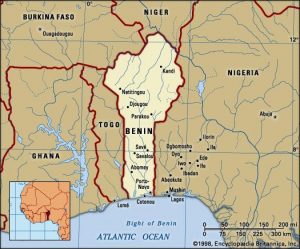This project is made possible through the partnership of WATER CHARITY and the NATIONAL PEACE CORPS ASSOCIATION. ![]()
Location
Gbaka, Benin
 Community Description
Community Description
Gbaka is a small agrarian community, consisting mostly of paid laborers or subsistence farmers. Very few of the community’s children attend school. Malnutrition and waterborne illnesses are reported to be significant problems by neighboring health center staff.
Problem Addressed
The community has very limited access to water. Currently, community members spend as much as several hours each day walking between 4-6 km to neighboring communities and carrying water back on their heads. Even then, the water they are consuming is contaminated, and it is usually improperly stored.
Project Description
This project is to build a water system for the community. A 3-kilometer water line will be run from the water source, and two water stations will be built, each with 3 faucets.
A community water management committee has been formed to spearhead the project. They have already worked with the local mayor’s office and surveyor to measure the distance for the pipeline and develop the budget.
The piping will be connected and buried by the regional plumber and his staff. The local mason will make bricks and build the water stations. The community will contribute unskilled labor of digging and assisting the masons, and provide local materials, totaling 25% of the total cost. They will also provide food for all those involved in construction.
An educational program will be developed to engage local inhabitants on the importance of basic sanitation and safe water storage practices.
Project Impact
400 people will benefit from the project.
Peace Corps Volunteer Directing Project
Sarah Rhodes
Monitoring and Maintenance
The water management committee will monitor the system and provide maintenance and repairs as needed.
Comments
Women and children are the main beneficiaries of this project, as they typically bear the physical, time-consuming burden of retrieving water for their households. While not an official Let Girls Learn project, it carries with it the same attributes, relieving young girls of the burden of retrieving water, and thus making it easier to remain in school. Therefore, we designate it as a Let Girls Learn + project.
Let Girls Learn
Women and children are the main beneficiaries of this project, as they typically bear the physical, time-consuming burden of retrieving water for their households. While not an official Let Girls Learn project, it carries with it the same attributes, relieving young girls of the burden of retrieving water, and thus making it easier to remain in school. Therefore, we designate it as a Let Girls Learn + project.
This project has been made possible through the generosity of an anonymous donor.
This project has been completed. To read about the conclusion, CLICK HERE.